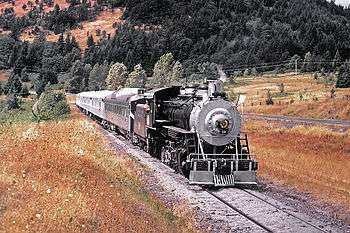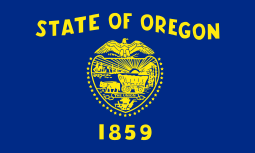Oregon, Pacific and Eastern Railway
| Reporting mark | OPE |
|---|---|
| Locale | Oregon |
| Dates of operation | 1904–Current |
| Track gauge | 4 ft 8 1⁄2 in (1,435 mm) standard gauge |
| Headquarters | Roseburg, Oregon |

The Oregon, Pacific and Eastern Railway (reporting mark OPE) is a short line railroad that began in 1904 as the Oregon and Southeastern Railroad (O&SE). The line ran 18 miles (29 km) between the towns of Cottage Grove and Disston. The Oregon, Pacific & Eastern Railway Company incorporated in 1912, and purchased the physical assets of the O&SE two years later. The OP&E's operations ran some 16.6 miles (26.7 km) from an interchange with the Southern Pacific Railroad at Cottage Grove, then east to Culp Creek. The last of the track was closed and scrapped in 1994.[1] A successor corporation now operates a narrow-gauge line at Wildlife Safari.
Overview
The company reorganized in 1940 under the same name, and was purchased by the Booth-Kelly Lumber Company in 1947. Georgia-Pacific subsequently purchased Booth-Kelly (including the OP&E) in 1959, and in turn sold it in 1970 to Willis Kyle, who formed the Row River Investment Company (jointly owned by Kyle Railways and Bohemia, Inc.). The line operated passenger excursions from 1972 until 1987. At that time the train used a self-propelled Budd Rail Diesel Car originally built for Southern Pacific, which had spent most of its life on the Southern Pacific subsidiary Northwestern Pacific. On OP&E it was known as "The Goose".
The 1973 motion picture Emperor of the North Pole, starring Lee Marvin, Ernest Borgnine, and Keith Carradine was filmed along the railroad's right-of-way and using some of the company's equipment. The film was released on DVD as Emperor of the North. In 1985, Stand By Me, a Rob Reiner motion picture of a Stephen King novelette, was filmed along the railroad as well.[2]
In March 1986, the company owned a total of three locomotives, 31 boxcars, and 44 flatcars. All of that fleet is gone, except for an old GE 44 ton locomotive.
Bohemia Incorporated bought out the railroad in Cottage Grove from Kyle in 1987. Kyle's 2-8-2 Mikado Steam Engine #19 was returned to the Yreka Western Railroad (another Kyle railroad) in California that same year. In 1994, Bohemia discontinued service along the entire 17 mile OP&E line. The line was then abandoned and taken up as scrap and made into a hiking and bike trail, the Row River National Recreation Trail.[3][4] The Oregon Pacific & Eastern Railway was dissolved as a corporation on December 19, 1994.[5]
"New" OP&E Railway
The Oregon Pacific & Eastern came back to life and was incorporated as an Oregon corporation in 2001 by Robert W. Larson. Larson is a long time consultant to Mr. Kyle and a former employee of the OP&E from Roseburg, Oregon. Larson is now the President and CEO of the new OP&E. Currently Larson owns a GE-44 ton locomotive that will have the original OP&E reporting marks added. Larson worked with Athearn to produce HO and N scale models of OP&E and Yreka Western boxcars. Bowser/Stewart Hobbies also made an unauthorized version of a 50-foot 2- and 4-door tapered-roof HO scale model auto-boxcar.
In March 2007, the OP&E took over as a concession operator of a narrow gauge railroad operation at Wildlife Safari in Winston, Oregon. Larson also owns the LP&N (Longview, Portland & Northern Railway) in Gardiner, Oregon.
Gallery
 OP&E 100
OP&E 100 OP&E 19, a 2-8-2 locomotive currently in Yreka, California In the film "Emperor of the North" it was known as "Shack's Train"
OP&E 19, a 2-8-2 locomotive currently in Yreka, California In the film "Emperor of the North" it was known as "Shack's Train" OP&E 5, a 2-8-0 locomotive currently in a museum in Galveston, Texas
OP&E 5, a 2-8-0 locomotive currently in a museum in Galveston, Texas OP&E 602
OP&E 602
Notes
- ↑ "Western Rails: Oregon, Pacific & Eastern". trainweb.org. TrainWeb. Retrieved 10 December 2010.
- ↑ "Abandoned Railroads of the Pacific Northwest: Oregon Pacific & Eastern Railway". brian894x4.com. Brian McCamish. Retrieved 10 December 2010.
- ↑ "Row River National Recreation Trail, Cottage Grove, Oregon". americantrails.org. US Bureau of Land Management. Retrieved 10 December 2010.
- ↑ "Row River Trail" (PDF). cottagegrove.org. US Bureau of Land Management. Retrieved 10 December 2010.
- ↑ "Employer Status Determination: Oregon Pacific & Eastern Railway" (PDF). rrb.gov. Railroad Retirement Board. Retrieved 10 December 2010.
External links
 Media related to Oregon, Pacific and Eastern Railway at Wikimedia Commons
Media related to Oregon, Pacific and Eastern Railway at Wikimedia Commons
